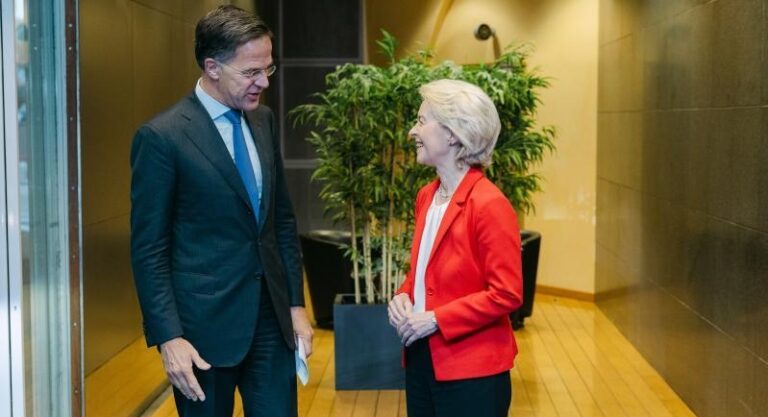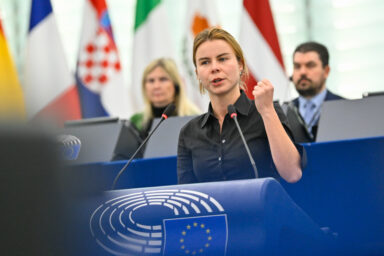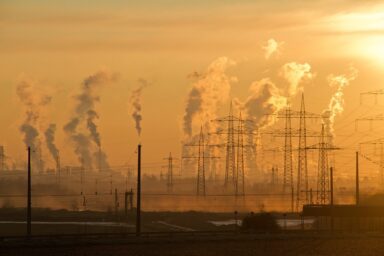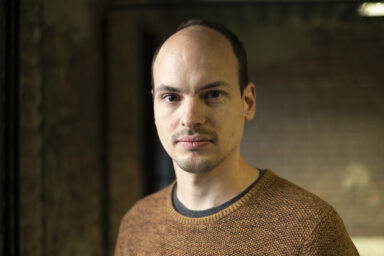Ursula von der Leyen, president of the European Commission, and Mark Rutte, NATO’s secretary-general, presented a united front on European security in Brussels on 30 September 2025. Ms von der Leyen pressed for the so-called drone wall, disregarding German defence minister‘s apparent resistance to the idea.
The Commission’s proposed “drone wall” along the EU’s eastern flank dominated the conference. Ms von der Leyen called it a necessity under the Eastern Flank Watch initiative: “Europe must deliver a strong, united response to Russia’s drone incursions.” She linked the plan to broader defence reforms, including interoperability and joint procurement.
Costly and redundant?
“Member states have a single set of forces assigned to NATO, EU, or UN missions. We need capabilities that are interoperable.” she said. Mr Rutte endorsed the project: “The drone initiative is timely. We cannot spend millions on missiles to take out drones costing thousands.”
Their remarks came 24 hours before EU leaders were set to discuss defence priorities at an informal council meeting — and less than 24 hours after the drone-wall proposal faced pushback. Germany’s defence minister Boris Pistorius had criticised it as “costly and redundant”. Ms von der Leyen did not address his remarks directly but insisted: “Immediate action is non-negotiable.” Mr Rutte sidestepped the potential rift: “NATO participated in the Eastern Flank meeting. Unity is our strength.”
Ms von der Leyen framed the moment as pivotal: “We are at a point where decisive action can lead to a turning point.” She stressed that Russia’s economy—with interest rates at 17 per cent and inflation above 10 per cent—was buckling under Western sanctions. “Russia’s GDP fell from 4.3 per cent in 2024 to 0.9 per cent this year. We must increase pressure.”
You might be interested
Sanctions and loans
Both leaders emphasised military support for Ukraine. Ms von der Leyen noted that Russia had captured just 1 per cent of Ukrainian territory in 1,000 days despite losing over 250,000 soldiers. She announced a €2bn drone package for Kyiv: “This allows Ukraine to scale up capacity—and the EU to benefit from the technology.”
A “reparations loan” tied to frozen Russian assets was also proposed. “The loan would be dispersed in tranches with conditions. Ukraine repays it if Russia pays reparations,” she said. Mr Rutte praised American aid under the Pearl Initiative: “The floodgates are open. Lethal and non-lethal weapons are crucial.”
A ramped-up, resilient European defence industry is key. — Ursula von der Leyen, president of the European Commission
Ms von der Leyen touted the EU’s SAFE funding instrument and defence-industrial plans. “A ramped-up, resilient European defence industry is key. It must deliver state-of-the-art equipment at speed and scale.” Mr Rutte highlighted NATO-EU coordination: “We work as one team. NATO sets capability targets; the EU leverages its internal market.” He cited recent drone incidents in Poland, Estonia, and Denmark: “Even if not intentional, Russian actions are reckless. We must protect our skies.”
The road to 2030
The pair outlined next steps, including a “readiness roadmap 2030” to be finalised with NATO in weeks. Ms von der Leyen stressed urgency: “We need defence flagships now. Industry must innovate.” Mr Rutte echoed her, recalling their long partnership: “We were friends when I was prime minister. Now cooperation is at all levels—not just between us, but across institutions.”
Ukraine is our first line of defence. If they fail, we fail. — Mark Rutte, NATO’s secretary-general
As the press conference closed, both leaders framed the informal EUCO summit as a litmus test. “Tomorrow’s discussions will shape Europe’s security for decades,” said Ms von der Leyen. Mr Rutte was blunter: “Ukraine is our first line of defence. If they fail, we fail.”
Light at the end of the tunnel
Ms von der Leyen and Mr Rutte delivered their statements before 9am, but the Commission president already had an intervention in another war under her belt. She welcomed US President Donald Trump’s peace proposal to end the Israel-Hamas war in Gaza. She appreciated Mr Trump‘s “commitment to end the war” but stressed: “A two-state solution remains the only viable way forward.” Striking a careful balance, she also linked ceasefire demands to humanitarian aid and hostage releases.
Council president António Costa urged parties to “seize this moment” for peace, citing Gaza’s “intolerable” state. Arab and Muslim nations—including Saudi Arabia, Jordan, and Egypt—issued a joint statement welcoming Mr Trump’s efforts to “end the war, rebuild Gaza, and prevent displacement”. They pledged to “cooperate positively” with America. The Palestinian Authority (PA) praised Mr Trump’s “sincere and determined efforts”, expressing confidence in his ability to forge peace.
Palestinian militants, not surprisingly, disagreed. Islamic Jihad called the plan a “recipe for continued aggression”, accusing Israel of using America to impose war-time aims. Hamas officials, briefed by Qatar and Egypt, demanded written details. Senior Hamas figure Muhammad Mardawi told Al Jazeera the plan “leans towards the Israeli perspective…close to what Netanyahu insists on”.










